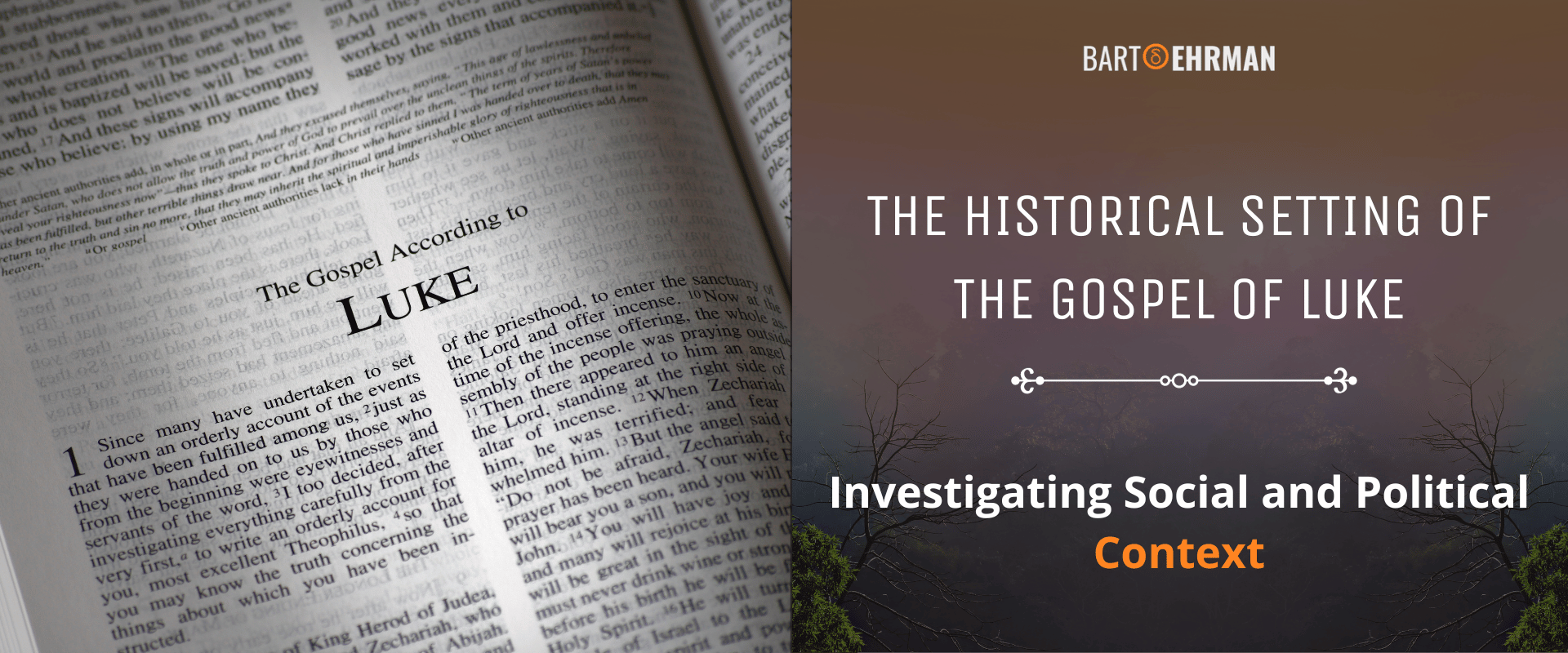The Historical Setting of the Gospel of Luke: Investigating Social and Political Context

Written by Marko Marina, Ph.D.
Author | Historian
Author | Historian | BE Contributor
Verified! See our guidelines
Verified! See our editorial guidelines
Date written: October 10th, 2023
Disclaimer: The views and opinions expressed in this article belong to the author and do not necessarily match my own. - Dr. Bart D. Ehrman
Luke’s Gospel, one of the four canonical books of the New Testament, offers readers a profound glimpse into Jesus' life and teachings. Yet, as with any ancient text, understanding its true meaning and significance requires delving into the rich tapestry of the historical setting of the Gospel of Luke.
In this exploration, we journey through time to unravel the world in which Luke penned his account. By closely examining his distinctive message, we will uncover how the social and political climate of his era shaped the words and narrative he crafted.

The Authorship, Dating, and Sources: The Gospel of Luke
The Gospel of Luke is the first book of a two-volume work that scholars typically call “Luke-Acts”. Luke gives us not merely an account of Jesus’ ministry and death but also the first history of the Christian movement - from the origins in Jerusalem to Rome, the center of the Empire.
While discussing the Gospel of Mark, I was reluctant to use the term “Christian” because Mark never uses it. However, Luke does! It shows up in Acts 11:26. Luke implies that outsiders in Antioch first used that term to label Jesus’ followers.
The appearance of the name suggests that Luke thinks of the Jesus movement as a distinct group separate from Judaism. It’s a movement that now deserves its own history. In other words, the historical setting of the Gospel of Luke differs from that of Mark or Matthew.
This insight, as we’ll see soon, can give us a small window into the social and political background of Luke.
Most scholars date Luke-Acts between 85.-100. C.E. By this time the author, whose name is not known, but I’m calling him Luke for convenience, could look back at how much had happened since Jesus was born.
In the opening sentence of the Gospel of Luke, the author informs us that he is not the first person to write these things. “Many”, Luke says, “have undertaken to draw up an account of the things that have been fulfilled among us (Lk 1:1).” In other words, Luke used previous writings to create his account of Jesus’ life and death.
Moreover, Luke presents himself as a historian - someone who investigated and used his sources. One source was the Gospel of Mark, which provided him with a basic plot.
However, Luke changed and edited Mark, presented his theology and core message, and gave us a particular portrayal of Jesus. By closely examining the theme of the Book of Luke, one can discover Luke’s specific political and social setting. What is the historical context of Luke’s Gospel?
Jesus’ Life within the Grand Scale of the Empire
From the beginning, it's clear that Luke aims to situate Jesus' life within a broader, empire-wide context. Specifically, the birth account of Jesus in Luke’s Gospel highlights the author's keen interest in the political dynamics of power distribution. By looking at the way he crafted his birth account, we can understand the historical setting of the Gospel of Luke.
He situates Jesus’ birth within the empire-wide census under the Caeser Augustus (Lk 2:1-7). The explicit naming of Caesar Augustus reveals Luke’s particular message. He juxtaposed Jesus with Augustus to emphasize that Jesus, not the Roman Emperor, is a true savior of the world.
Did You Know?
Jesus wasn’t the only miracle-working Son of God in the Roman Empire. Augustus, for example, was celebrated as a divine savior who brought peace to the world. The Priene Calendar Inscription describes Augustus' birth as the "beginning of the good tidings (εὐαγγέλιον) for the world that came by reason of him."
Even though Augustus is not a savior, Luke uses him for a different rhetorical purpose. As Joseph Fitzmyer in his Commentary observes: “In introducing Caesar Augustus, the supreme ruler of the Roman world, Luke depicts him as an agent of God, who by his edict of registration brings it about that Jesus is born in the town of David.”
In other words, from a pagan emperor worshiped by many, Augustus became a servant of one true God by creating perfect circumstances for Jesus’ birth. In an excellent essay, Leif E. Vaage showed how Luke’s birth narrative corresponds with the “Pax Romana” ideal. By crafting his birth narrative, Luke didn’t want to deny the imperialist ideal of peace and prosperity (the good tidings), but only to shift credit from Augustus to Christ.
Consequently, the Gospel of Luke utilized the political context of the Roman Empire and the reign of Augustus to impose a particular narrative about Jesus, his death, and resurrection.
Salvation, But for Whom? Jews or Gentiles?
What is the social context of the Gospel of Luke? As it turns out, Luke displays several interesting accounts that can help us answer that question. The most interesting is Jesus’ “inaugural sermon”.
In Luke 4:14-28 Jesus begins his ministry in Galilee after the devil tempted him. He arrives in his hometown of Nazareth, goes to the synagogue on the Sabbath, and reads from the prophet Isaiah. He concludes by saying: “Today this scripture is fulfilled in your hearing (Lk 4:21)."
However, the gathered people are not pleased. Regarding his miracles, Jesus anticipates their reaction: “And you will tell me: ‘Do here in your hometown what we have heard that you did in Capernaum’ (Lk 4: 23)." But he warns him that no prophet is accepted in his hometown.
Then, Jesus reminds them of incidents from the careers of the Old Testament prophets Elijah and Elisha. The latter, for example, didn’t cleanse any lepers of Israel but only Namaan who was not a Jew (Num. 2:5-19). This sermon is only found in Luke’s account. When the gathered people heard this, they became enraged and drove Jesus out of the town. But why?
Because the incident that Jesus was describing showed the prophets bringing their message to Gentiles, not Jews! This is a major theme of Luke-Acts volume and it reveals an important element of the historical setting of the Gospel of Luke. To be more precise, it opens up a window into the social context of the Gospel of Luke. What do I mean by that?
In the late 1st century C.E. when the Gospel of Luke was penned, it's important to note that most Christians were Gentiles, even though both Jesus and his apostles were devout Jews. This circumstance presented a theological dilemma.
After all, the Messiah had been prophesied for the Jewish people. So, a pressing question arose: How could Jesus be recognized as the Jewish Messiah when his Church consisted predominantly of Gentiles?
Why did Luke write his Gospel for the Gentiles? In his Introduction to the New Testament, Delbert Burkett notes that “one of Luke’s primary purposes is to explain or justify this situation.” To do that, Luke insists that God opened his salvation to Gentiles because the Jews rejected Jesus’ message.
Another example of the same theme is found in Acts 13: 13-31. Luke describes how Paul and Barnabas went on the Sabbath to the synagogue in Antioch. Despite his passionate preaching, the Jewish crowd sharply criticized Paul.
After that, Paul announces: “The people of Jerusalem and their rulers did not recognize Jesus, yet in condemning him they fulfilled the words of the prophets that are read every Sabbath (Lk 13:27)."
In other words, Paul is emphasizing that because of their rejection, he is turning his message to Gentiles. After that, the angry Jews drive Paul and Barnabas out of their region.
In The New Testament, Dr. Ehrman observes that the Jewish rejection of Jesus in Luke meant the rejection of God. Consequently, Jesus had to take his message elsewhere. In other words, the good news will spread among all other people. And this is all according to God’s plan. The same plan continues with the initial spread of the Christian community as depicted in the Acts.
This rhetorical device embedded into the narrative of both Luke and Acts reveals a state of developed Christian identity, separated from the Jewish religion.
In reality, the Jewish population rejected Christians and their message first. Consequently, Luke projects this context onto his account of Jesus’ life and death. This represents a proper historical setting of the Gospel of Luke.
Salvation, But for Whom? Luke’s Message for the Underdog
As with the other two Synoptic Gospels, Luke’s core message is about the arrival of the Kingdom of God. He does soften Mark’s strong emphasis on the immanence of the Kingdom’s arrival (Lk 17:20-21), but the Jewish apocalyptic message is intact.
However, Luke shifts his focus to specific social groups as those who will enter into the Kingdom of God. In a nutshell, the Gospel of Luke insists that those who occupy the margins of society will be the first to enter into the eternal Kingdom.
For Luke, it all starts with Jesus. He is portrayed as someone who has a reputation for being “a friend of tax collectors and sinners (Lk 7:34).” This represents a common theme in the Gospel of Luke. Jesus places special concern on the “little man”.
In other words, the underdogs are of the most importance to Jesus. In one instance Luke has Jesus saying: “I didn’t come to call the righteous but sinners to repentance (Lk 5:32).” In another place Jesus asserts that “the Son of Man came to seek and save the lost (Lk 19:10).”
Explore the slight but significant difference between Matthew’s and Luke’s Sermon on the Mountain in the table depicted below.
The Gospel of Matthew | The Gospel of Luke |
|---|---|
"Blessed are the poor in spirit, for theirs is the kingdom of heaven (5:3)." | "Blessed are you who are poor, for yours is the kingdom of God (Lk 6:20)." |
Which one is it? The poor in spirit, or just poor? I’m not entering into the Historical Jesus question. My only point is to draw your attention to Luke’s particular message. For Luke, Jesus came first and foremost to the outcasts, sinners, slaves, women, and poor people. He came to those who are rejected or marginalized by the elites of the society.
The social setting of the Gospel of Luke is best illustrated by the parable of the rich man and Lazarus. In a captivating account of an afterlife vision, the poor man receives all the blessings in paradise while the rich Lazarus is suffering in hell (Lk: 19-31). As the old saying goes: “The tables have turned.”
Have you ever wondered where the Christian idea of the afterlife came from? Do you think that Jesus believed in Heaven and Hell? Read Dr. Ehrman’s excellent book “Heaven and Hell”. You might be surprised by what you find!
Luke’s Gospel was, according to most scholars, initially an account of Jesus’ life and death intended for a specific (Christian) community. Luke crafted his narrative by employing various rhetorical devices and emphasizing particular themes. Consequently, these themes give us a glimpse into the historical (and social) setting of the Gospel of Luke.
The Gospel of Luke summary centered around several key ideas.

Summing up Conclusions
In exploring the historical setting of the Gospel of Luke, we have delved into several key themes that shed light on the context in which this Gospel was written.
We began by examining the prevailing opinions among modern scholars regarding the dating, authorship, and sources of Luke's Gospel. This foundational understanding provided a solid backdrop for our subsequent analysis.
We then journeyed through the narrative lens of the Gospel, observing how Luke skillfully placed Jesus' life within the grand narrative of the Roman Empire. Our investigation also uncovered a central theme: the recipients of salvation. Luke's Gospel illustrates a shift from a message initially intended for the Jews to one embraced by Gentiles.
Furthermore, we've seen how Luke's message is inherently inclusive, reaching out to the underprivileged and marginalized members of society.
In closing, our exploration of the historical setting of the Gospel of Luke has illuminated the multi-layered context in which this Gospel emerged. It underscores the intricate interplay between politics, theology, and social dynamics, inviting us to engage more deeply with this timeless text and its enduring relevance.
Do you want to take the next step and investigate the Gospels as a historical source? Have you wondered what modern historians discovered about the origins of Christianity? Join “The Unknown Gospel” course by Dr. Bart Ehrman. Click the link below and take a journey back to the 1st century!
